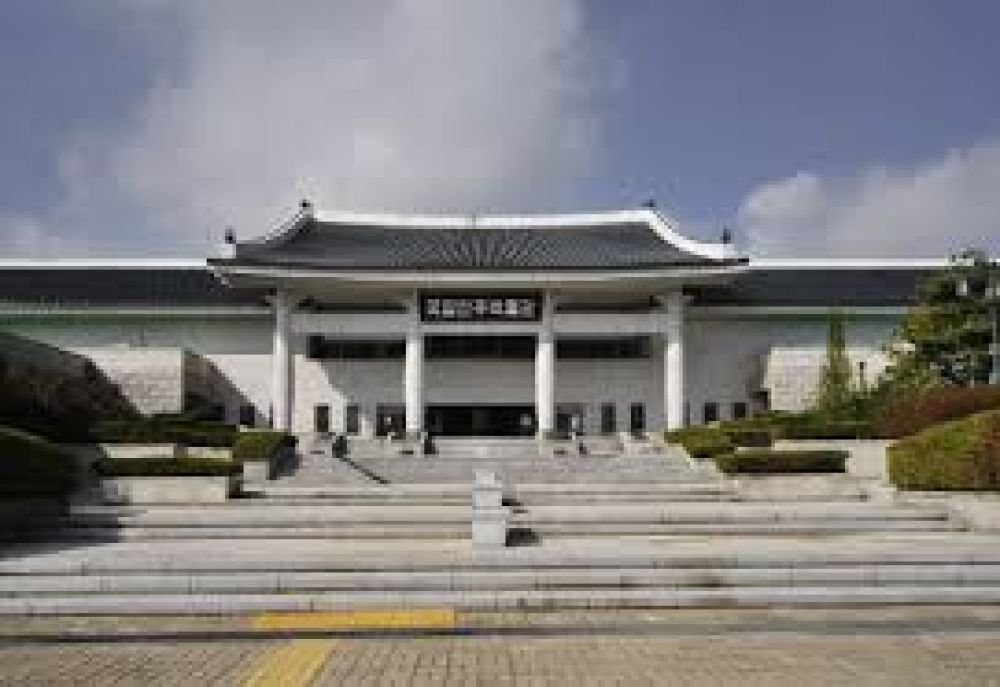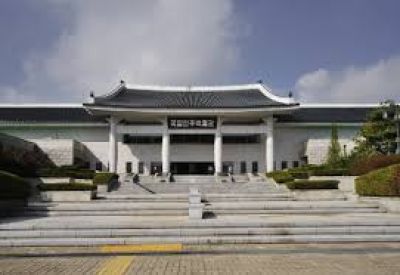

Participants at Jeonju National Museum can immerse themselves in traditional Korean culture by engaging in various hands-on activities. These may include learning the unique Korean art of paper-making known as 'hanji', practicing traditional calligraphy, or understanding the intricate process of creating Hanbok, the traditional Korean attire. Each activity is designed to provide a deep insight into the cultural heritage and artistic techniques of Korea. Expert craftsmen and practitioners lead these sessions, giving visitors a chance to ask questions and get personalized guidance. These cultural experiences are an excellent way for visitors of all ages to connect with the past and appreciate the aesthetics of Korean traditions.
The Jeonju National Museum offers an extensive tour of its permanent exhibitions, which showcase a rich array of historical artifacts and artworks from the region. Exhibits cover various aspects of Korean history, from prehistoric times to the Joseon dynasty. Visitors can view pottery, paintings, calligraphy, and even royal artifacts that paint a picture of Jeonju's cultural importance through the ages. With explanatory signs and multimedia presentations, each collection provides visitors with the context needed to understand and appreciate the significance of the items on display. Educational and enriching, a tour of the permanent exhibitions is ideal for history buffs and those looking to understand Korea's past.
Jeonju National Museum regularly hosts lecture sessions where expert historians and scholars share their insights on various topics related to Korean history and culture. These sessions cover a wide range of subjects, from the archaeological methods used to uncover artifacts in the region to the influences of neighboring cultures on Korean society. By attending these lectures, visitors gain a deeper understanding of the historical context that shaped the current landscape. The lectures are typically conducted in Korean, but some may offer English translation or summaries for international visitors. This activity offers an intellectual deep dive into the country's past, perfect for those eager to expand their knowledge.
Throughout the year, Jeonju National Museum becomes the stage for various cultural festivals and events that celebrate Korean traditions and holidays. These include lively performances such as traditional music concerts, dance shows, and reenactments of royal ceremonies from the Joseon dynasty. Additionally, special events like the Jeonju Hanji (Korean Paper) Festival contribute to the festive atmosphere. Visitors can witness spectacular parades, participate in cultural workshops, and enjoy traditional games. These events not only provide entertainment but also offer a priceless opportunity to see the local customs come to life and to interact with the community.
Jeonju National Museum pays special attention to its younger audience through tailored educational programs that allow children to engage with Korea's cultural heritage in interactive ways. Activities geared towards kids include treasure hunts throughout the museum, storytelling sessions featuring legends and folklore, and art and craft workshops where children can create their own traditional masks or mini totem poles. Educational and at the same time fun, these programs are designed to stir curiosity and inspire a lasting interest in the rich tapestry of Korean history and culture in a way that is accessible and enjoyable for children.
For visitors who prefer a structured approach to exploring the Jeonju National Museum, guided tours are an excellent option. Experienced guides lead groups through the various exhibition halls, providing detailed commentary on the artifacts, the stories behind them, and their significance within Korean culture. Often, these guides add personal anecdotes or lesser-known facts that enhance the visit. These tours can be particularly beneficial for first-time visitors or those seeking a more in-depth understanding of the exhibits. Each tour is meticulously planned to cover the highlights of the museum and is an effective way to ensure visitors do not miss the most significant and interesting items.
Jeonju National Museum regularly hosts special exhibitions that spotlight particular aspects of Korean heritage or feature works from other nations and cultures for a limited time. These exhibits are carefully curated and offer unique themes, such as the influence of Buddhism in Korean art or a showcase of contemporary Korean artists. Visiting these special exhibitions is an opportunity for visitors to expand their horizons and experience something new with each visit. The variety and quality of the exhibitions reflect the museum's commitment to educational excellence and cultural exchange.
At Jeonju National Museum, visitors have a rare chance to witness the meticulous process of artwork restoration. These demonstrations are run by professional conservators who work on preserving pieces of cultural heritage like ancient documents, textiles, or paintings. Observing the restorers at work reveals the intricate techniques and the level of care taken to ensure that the future generations can continue to enjoy these treasures. Additionally, the restorers often explain the restoration process and answer questions from the public, providing an enlightening perspective on the complexities of cultural preservation.
Adult visitors to Jeonju National Museum have the chance to delve into detailed aspects of Korean culture through thematic workshops. These sessions can range from traditional Korean cooking classes, which may include learning how to make kimchi or bibimbap, to exploring Korean herbal medicine's historical roots. Other workshops may focus on the art of tea ceremony or the aesthetics of Korean garden design. Participants benefit from the expertise of specialist instructors and leave with a richer understanding of the cultural topic covered, along with practical skills or knowledge they can apply in their everyday lives.
Occasionally, Jeonju National Museum extends its hours into the evening for special Museum Night events. These events transform the museum experience with a mix of live performances, night-time guided tours, and unique interactive installations. They often coincide with cultural celebrations or significant dates in the Korean calendar and provide a magical atmosphere different from the daytime visit. Whether it's the museum lit up with lanterns or special events designed to celebrate a full moon, these nights are perfect for those looking to experience the museum in a new light.
